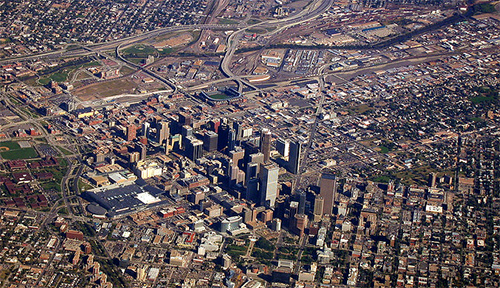
Do people smile because they are happy or because they are too dumb to know they should be frowning? That, it seems to me, is the basic issue posed by the article on Denver by James Burbank. Maybe I am just a happy fool, but I opt for the former.
I have always liked Denver, and I still do. I have visited the city often since the 1960s when my brother was doing his training there in psychology. I edited a newspaper there, got married there and lived in a charismatic little tree house above a museum. I attended the lively alternative music festival on South Broadway a couple of years ago. And last week my wife and I rendezvoused with two friends in Denver to celebrate our 29th wedding anniversary.
Yes, I have noticed that people tend to smile a lot in Denver, but for the life of me I can’t see why I should hold that against them. Have you noticed that people smile more in Albuquerque than they do in most other big cities? Are they, too, doomed to some kind of hell reserved for hypocrites and idiots?
And yes, the traffic in Denver is horrendous. But the traffic in the city itself is no worse than most other cities. The really bad traffic jams are in the suburbs, extending 50 or more miles north and south along the Front Range, sometimes all the way from Colorado Springs to Fort Collins.
But is the city at fault for its suburbs’ idiosyncrasies?
The problem with Denver is not the city but the city’s context. The city has a tiny geographical area and only 500,000 residents, just marginally more than the city of Albuquerque. But nearly 2 million people live in the surrounding suburbs (as opposed to only about 400,000 around Albuquerque). These are the people stuck in traffic jams, crowding the strip malls and calling cookie-cutter subdivisions home. It has been one of the tragic consequences of Colorado’s dysfunctional politics that the city of Denver was never able to annex its suburbs, thus imposing some kind of civilized order on the metastasizing suburban chaos.
Over the decades of my experience with Denver, it has maintained and even expanded on its good qualities. It has a lot of parks, and many of them are large and lush. It has one of the finest art museums in the nation. It has both a sophisticated cultural and a vibrant countercultural scene. Its transit system is one of the best among big cities.
The Capitol Hlil neighborhood on the edge of downtown, where my wife and I lived, has retained its 19th-century character over the passing decades. There, elaborate mansions sit side by side with modest houses and apartment buildings. Residents range from the down and out to multimillionaires, from retirees to students. From this neighborhood, it is possible to get anywhere quickly by bus or rail.
But who needs to go anywhere? Unlike the older parts of Albuquerque, Capitol Hill has a supermarket, hardware store, movie theater, parks and an assortment of upscale and downscale shops, bars and restaurants. Le Central, the French restaurant on Capitol Hill where my wife and I celebrated after our wedding in 1983, is still open at the same location serving the same delectable food at the same modest prices.
The biggest problem with Denver, as in San Francisco and Manhattan and a dozen other places of which I am fond, is the feeling you are living on a metaphorical island surrounded by a a sea of lapses. While being in Denver is delightful, getting into or out of it is not. The mountains, which used to be less than an hour away, now require, as James Burbank points out, hours to get to, at least during rush hours, which have expanded to four hours each morning and afternoon.
Denver does not have a single lifestyle. It is the junction point of plains and mountains. Cowboys from eastern Colorado mix with techies from the new internet industries, rural church members rub shoulders with gays, millionaires wait in line with beggars and hippies. It can all make for a strange city, but that strangeness, in fact, is what cities are all about. Some enjoy sitting in traffic jams in their huge SUVs while others prefer to stroll along one of the several creeks flowing through the city. So be it.
Denver seems to combine the best and the worst of a lot of things, especially the weather. When I was there this month, the temperatures were warmer than in Albuquerque, but at the beginning of the month, just as the new marijuana stores were opening for business, snow and bitter cold had set in. Unlike James Burbank, I think the residents of Denver and their tourist guests showed rather good sense in not strutting their stuff in the cold while waiting in long lines to celebrate the landmark occasion: The world’s first legal recreational marijuana sales.
That this happened in Denver does not seem to me to be a coincidence. As one of the oldest cities in the West, it still seems to incarnate a young spirit. I would hope people might say as much of this old body of mine.



Responses to “Why do people smile?”